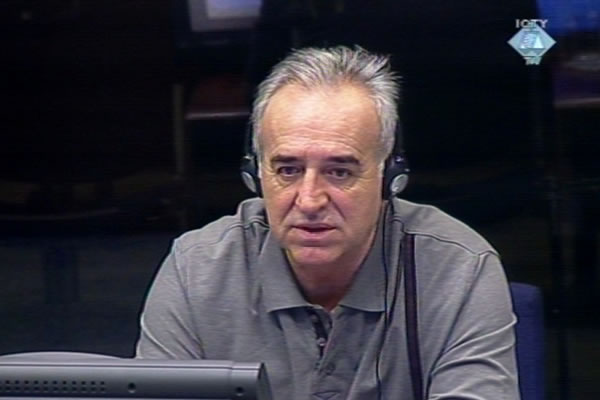Home
MOMIR NIKOLIC: HOW ‘EVIL’ IN SREBRENICA WAS PREPARED
Former security officer in the Bratunac Brigade is testifying at the trial of Radovan Karadzic. As the witness said, the fate of the citizens of Srebrenica had already been decided before the third meeting in the Fontana Hotel in Bratunac even started on 12 July 1995. Before the meeting, Popovic and Kosoric used more or less the same words telling Nikolic that ‘all balijas must be killed’ and their women and children deported. The witness later saw it happen
 Momir Nikolic, witness at the Radovan Karadzic trial
Momir Nikolic, witness at the Radovan Karadzic trial Momir Nikolic is testifying at the trial of Radovan Karadzic. During the Srebrenica operation in July 1995, Nikolic was chief of security and intelligence in the VRS Bratunac Brigade. In 2003, Nikolic and the prosecution reached a plea agreement and Nikolic was sentenced to 20 years. At the request of the Trial Chamber, Nikolic is testifying viva voce about the events in the summer of 1995 which lead to the genocide in Srebrenica.
In the first part of the examination-in chief, prosecutor Nicholls showed a document sent by the Bratunac Brigade commander Slavko Ognjenovic to his subordinate units on 4 July 1994, instructing them that ‘the enemy’s life must be made unbearable and their temporary stay in the enclave impossible so that they leave the enclave en masse as soon as possible, realizing that they can’t survive there’. In Nikolic’s view, the part of the document about ‘making the enemy’s life unbearable’ is ‘not controversial’. What is questionable is Ognjenovic's instruction about ‘creating unbearable living conditions for civilians’. This could be tied with the events in 1995 when the enclave really was ‘emptied’, Nikolic said. Distributing the document containing such orders ‘legalized disorderly conduct’ along the separation lines. This meant increased sniper activities, incursions into the enemy territory and other combat activities.
The prosecutor then brought up an order issued by the VRS Main Staff 20 days later, to ‘carry out detailed checks of convoys’ and prevent anyone from leaving the Srebrenica enclave. Commenting on the document, Nikolic said he had intelligence at the time that there wasn’t enough food in Srebrenica. There were many sick people and for some families the situation was hopeless. In a word, the people there ‘lived terrible lives’, Nikolic added.
Nikolic confirmed that the civilians moving in a column from Srebrenica towards Potocari on 11 July 1995 were shelled from the Serb-held positions at a location called ‘the cockade’, or ‘the star’. After the Serb troops entered Srebrenica, Nikolic was in charge of security at the meetings in the Fontana Hotel in Bratunac. On 11 July 1995, Mladic first met the Dutch Battalion commander, Colonel Karremans, in the hotel. That same evening, Mladic had a meeting with the representatives of the civilians from Srebrenica.
Before the third meeting in the Fontana hotel, on 12 July 1995 at 10am, Nikolic spoke to Vujadin Popovic and Svetozar Kosoric. Popovic was the security officer and Kosoric was the intelligence officer in the Drina Corps. They told Nikolic that the women and children from Potocari would be deported to the Muslim-controlled territory and that the men of military age would be separated from the women and children. Nikolic asked Popovic and Kosoric what would happen to the men. Popovic told Nikolic that ‘all balijas must be killed’. Kosoric repeated the same words to Nikolic almost literally.
When Nikolic went to Potocari that same day, he saw the Serb army separating men from women and children. This is when Nikolic ‘realized evil was afoot’. Describing the ‘triage’, the witness said that the soldiers mistreated the men: first they took away the bags the men carried and threw them on a pile, then stripped the men of their rings, bracelets, necklaces and other personal belongings. Finally, the soldiers detained the men in nearby houses where they kicked them, hit them with rifle butts and insulted them.
As Nikolic said, he didn’t dare ‘stand up against’ what was happening before his eyes in Potocari because of his past ‘bad experience’ and the fact that he was surrounded by the soldiers from the 10th Sabotage Detachment and the 65th Protection Regiment. ‘At the time hardly anyone could control them’, Nikolic remarked, adding that if he could go back in time, he would have done things differently. He would have tried to do something and help the people who were taken from Potocari before his own eyes and later killed at various execution sites around Srebrenica.
Momir Nikolic continues his evidence tomorrow.
Linked Reports
- Case : Karadzic
- 2012-02-10 HOW DERONJIC SAVED THE HONOR OF BRATUNAC
- 2012-02-09 PASSING THE BUCK
- 2012-02-08 KARADZIC’S SECRETARY TESTIFIES
- 2012-02-14 THE ONLY QUESTION WAS WHERE TO EXECUTE THE PRISONERS
- 2012-02-15 KARADZIC BLAMES ‘PERSONAL VENDETTAS’ AND ‘NON-PROFESSIONAL ARMIES’
- 2012-02-16 KARADZIC AND ‘LAWS OF CHAOS’
